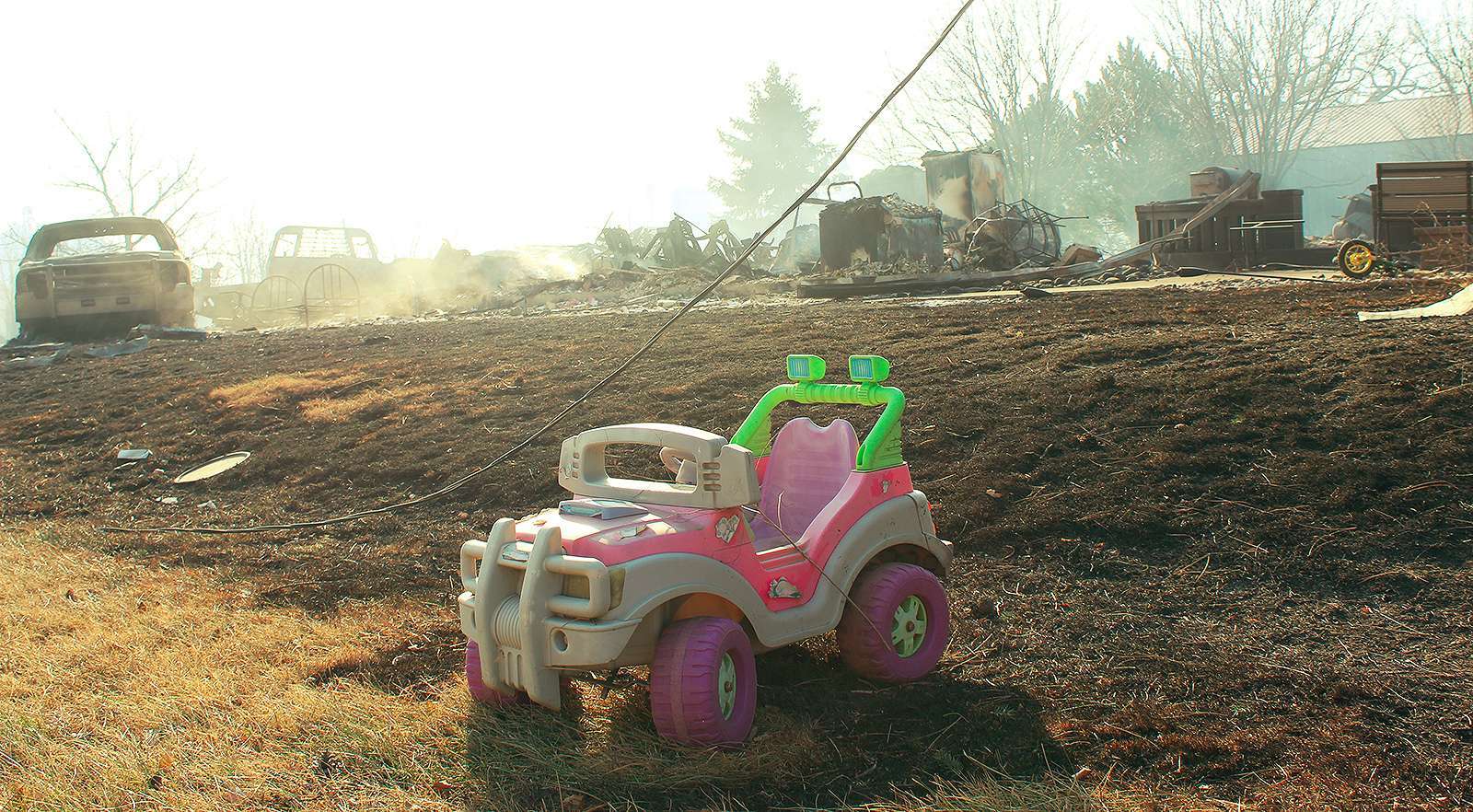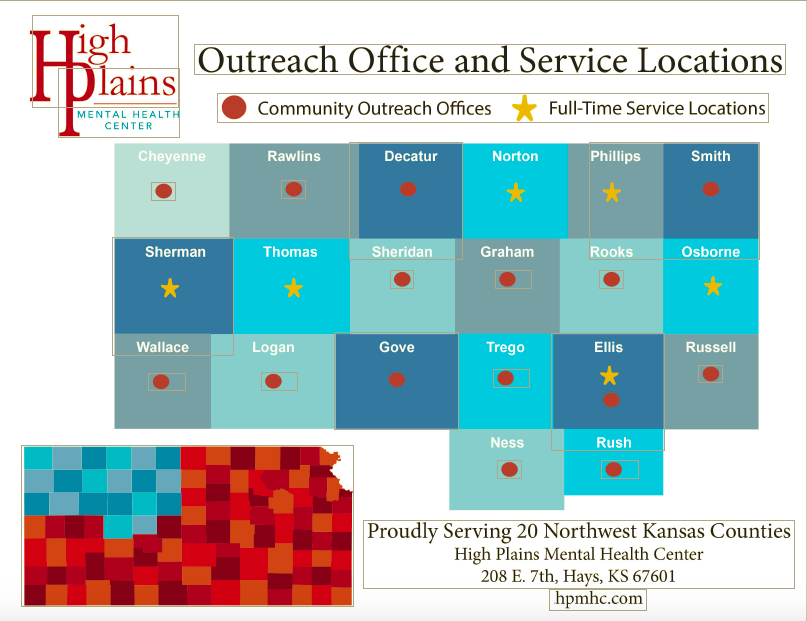
By CRISTINA JANNEY
Hays Post
A month after wildfires ravaged northwest Kansas, High Plains Mental Health is urging those affected to continue to care for their mental health.
The effects of a traumatic event, such as a wildfire, can last days, weeks or longer after the event happens, said Kaley Conner, High Plains Mental Health director of marketing.
"Mental health care is health care," she said. "It's no different than seeing your physician for high blood pressure or for asthma. There's no shame in reaching out and seeking mental health care because your brain is such an important part of your body."
David Anderson, High Plains director of clinical programs, said how a person responds to a trauma depends greatly on the individual.
"Sometimes people get through events like that, and they have very good support systems and have really good coping strategies. The impact on them may not be as significant as other folks.
"It's not just the event. It's the cumulative impact. If in addition to something like that, the person has also losses in their life that are outside that event. This may be a tipping point or the proverbial straw that broke the camel's back."
Dealing with traumatic stress
To remain physically and mentally healthy in the wake of a traumatic event, Conner and Anderson offered the following tips.
- Talk to others and share your feelings openly and honestly. Effective communication and “venting” can be helpful.
- To the extent possible, take good care of yourself by eating healthy, exercising regularly and try to get an appropriate amount of sleep (ideally, at least seven hours per night).
- Try to make time for activities you find relaxing and enjoyable, such as spending time with family, spending time in nature, taking a walk, going fishing, watching a good movie, etc. The possibilities are endless, but it should be a healthy activity that you enjoy.
- During this difficult time, it’s helpful to keep your life as routine as possible. Focus on areas you can control, such as when you go to bed, when you wake up, when you eat dinner, etc. Having some predictability in your routines and patterns can help provide some sense of stability in uncertain times.
- Avoid turning to alcohol or drugs (including excessive caffeine) as a way to cope through the difficult times and painful emotions.
Symptoms of a mental health need
Conner said there are also clues that might indicate someone may need to seek professional help to deal with mental repercussions of the trauma.
She said if a person is having difficulty with the four Ls — live, love, laugh and learn — it may be time to seek help.
"It is not uncommon after a traumatic event to experience a variety of symptoms," she said. "They can be emotional symptoms, physical symptoms, but the symptoms are so severe that they are affecting the person's ability to enjoy life (live), to love, to laugh, to learn. It's affecting work and school and it's impacting the quality of their life. It might be time to definitely reach out and seek professional help."
Anderson said people often don't realize that a significant change in sleep patterns may be connected to a mental health issue. This can mean people are having difficulty getting to sleep, staying asleep or sleeping more than normal.
Other physical symptoms may include stomach ache, disturbance in appetite, diarrhea/vomiting, feeling weak, chills, sweating, dizziness, fatigue, difficulty breathing, rapid heart rate, elevated blood pressure, muscle tremors, headache, nightmares and grinding teeth.
It can be difficult to determine if certain physical symptoms are due to a physical health condition or mental distress. If you are experiencing these symptoms, see a primary health care provider for evaluation.
Anderson said if a person suddenly is struggling with basic functions like getting up and going to work or school, he or she may need help.
Other symptoms of a mental health disruption may include the following:
Emotional: Anger, anxiety, fear, guilt, grief, denial, sadness, depression, uncertainty, over-sensitivity, irritability, frustration, emotional shock or numbing, and (rarely) severe panic or amnesia of the event.
Behavioral: Feeling jittery, startling easily, hyper vigilance, social withdrawal, changes in typical behavior, loss of interest in activities and hobbies, emotional outbursts, avoidance of thoughts/situations related to the event, feeling overly suspicious, change in sexual function.
Cognitive: Confusion, difficulty remembering or making decisions, flashbacks, nightmares, preoccupation with the event, intrusive thoughts or images.
Conner said another indicator may be how long the symptoms last. If your symptoms persist four weeks or longer after an event, it might be time to seek care.
In extreme cases in which a person's life was threatened, that person can develop post traumatic stress disorder. Anderson said they did hear instances of people who were stuck in vehicles and had to be rescued from the fires.
"We also heard tragic stories of people who had to shoot their livestock because they were hurt beyond the ability of veterinarians to care for," Anderson said. "I can't imagine personally what that must be like to work so hard to raise livestock and then have to go out and do that yourself."
Signs of PTSD can be reliving experiences, preoccupation with the traumatic event and heightened responses to triggers.
An event that affects the whole community
Anderson said the communities affected by the fires have pulled together to help fire victims.
"The community itself has become a giant resource for one another," he said. "In a lot of events where we see difficult things, when the community pulls together, you have really tremendous impact on individuals."
Friends and family members can help by watching for warning signs among their loved ones and bringing worrying symptoms to the attention of those individuals, Conner said.
"When they get concerned, it's really important to ask about those things and try to engage that person in a conversation," she said, "rather than ignoring the symptoms and pretending that everything's OK.
"It's important to address the situation head on in a kind and compassionate way and say, 'I'm concerned about you.' "
Being a good listener without being judgmental, not forcing advice and suggesting professional mental health care if needed can also be helpful, Conner said.
Sharing experiences can also be helpful, Anderson said.
"When people feel comfortable about talking about things and how it impacts them, it often frees other people to acknowledge what they're struggling with," Anderson said.
"If someone says, 'I don't know how you're doing, but for me, this has really been hard. I've had trouble.' and then talk about that. It opens the door for people."
Where to find help
High Plains Mental Health provides services in a 20-county area of northwest Kansas. Services are offered through full-time offices, satellite sites, as well as telehealth appointments via Zoom.
Anderson said telehealth allows a farmer or rancher to connect to services via a smart phone from their field or tractor instead of losing a half day traveling into town for an appointment.

A sliding-fee scale is available for qualifying clients who are uninsured or underinsured.
High Plains has a 24/7 crisis line, which can be accessed at 1-800-432-0333. The national Suicide Prevention Lifeline can be reached at 1-800-273-8255 or text 741741.
Critical Incident Stress Management services are available to agencies within the center's 20 counties at no cost to provide initial trauma de-briefing following catastrophic events. This service is often provided to first responders who have had to deal with traumatic events and disasters.
Rural fire fighters are usually volunteers and are often responding to emergencies for people who they know, Anderson said.
To learn more about High Plains services or to schedule an appointment, call 785-628-2871.
You can access the national Substance Abuse and Mental Health Services Administration disaster distress helpline HERE.
This site provides specific links on information on helping teens and children with mental health issues after disasters.
Anyone 13 and older in northwest Kansas can also access for free the online mental health tool Seven Cups of Tea at https://www.7cups.com/p/highplains/. Passcode is highplains for new members. Conner said Seven Cups is not meant for crisis, but is a 24/7 resource if you need someone to chat with or are looking for some coping tips.
Kansas Ag Stress is an online resource provided by the Kansas Department of Agriculture specifically geared toward offering mental health resources to those in the agriculture industry.






